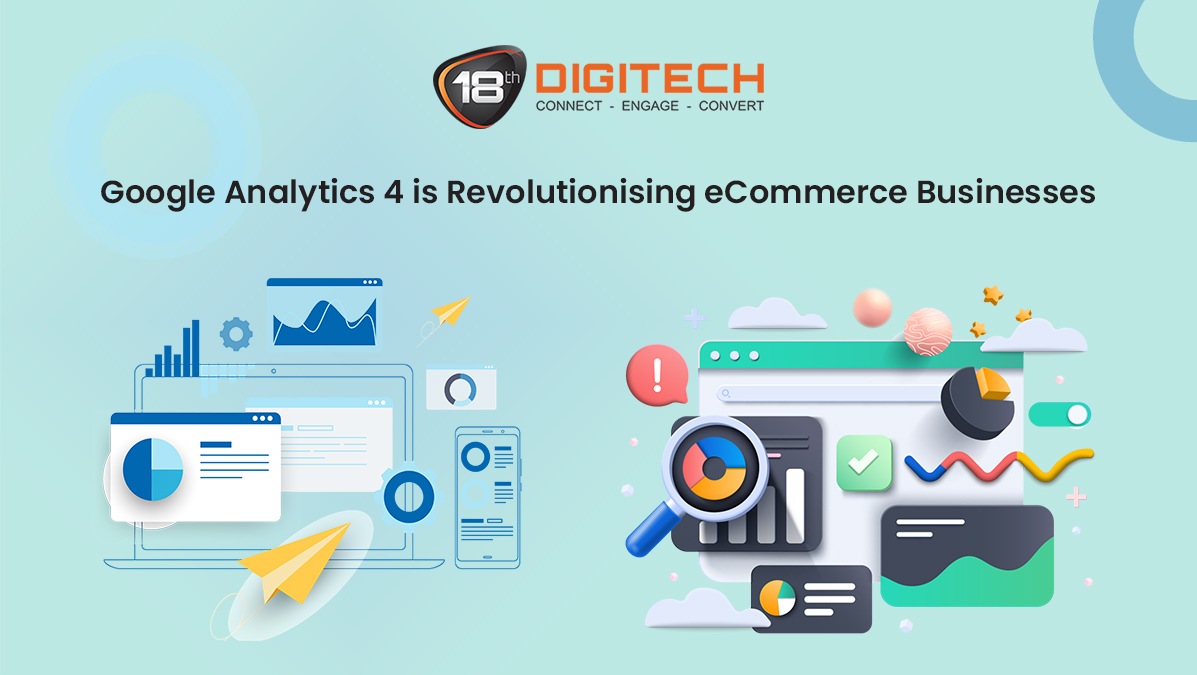Google’s latest iteration of the analytics platform, Google Analytics 4 (GA4) was announced in October 2020. GA4 is a successor of Universal Analytics (US) which had been in use for more than a decade. It comes with several advanced features and enhancements that make it relevant in the modern-day eCommerce business world.
The key point of differentiation between GA4 and Universal Analytics is the new data model that is more flexible and future-proof. While in GA4, data is organised around sessions and hits, data in GA4 is organised around events and user properties. This new model allows tracking user behaviour at a more granular level and provides detailed insights into how users interact with an app or a website. Cross-device tracking is another noteworthy feature of GA4 which was a major challenge with Universal Analytics, for example, tracking when a user browses a website on their desktop and makes a purchase on their mobile device. To identify users across devices, GA4 uses machine learning which provides a complete view of their behaviour. At the same time, GA4 also has several new reports and features that are relevant to eCommerce businesses. For example, the new eCommerce report provides a detailed insight into how users interact with an online store. This report also includes data on product views, add-to-cart events, and purchase events, as well as revenue data and conversion rates.
In this blog, we have enlisted the reasons why you should migrate to GA4 for your eCommerce business.
To understand why you should switch to GA4, you need to check out what GA4 offers.
Google Analytics 4 (GA4): Upgraded Features
Other than the fact that Universal Analytics is going to be ineffective from July 1, 2023, these are the reasons that make switching to Google Analytics a must.
- New Data Modelling: While Universal Analytics gathered data based on sessions, Google Analytics 4 functions on a user-based model that collects data in the form of events. To meet the platform’s fundamental reporting criteria, GA4 records different events automatically.
- AI-powered Predictive Data and Metrics: GA4 is powered by AI machine learning and will leverage AI to fill the gaps and connects the dots of user behaviour and website data without depending on cookie tracking. GA4 is designed to provide predictive metrics like purchase probability, revenue prediction, and churn probability to marketers to convert to make a purchase. For example, the expected revenue from any user in the coming 28 days who have been active during this period. Having more data on user behaviour on your website and the app will provide you with better predictive audience analysis. These metrics will help you develop segments of predictive audiences that in turn will allow you to create targeted campaigns without having to track cookies.
Google Analytics currently supports three predictive metrics:
- Predictive Probability: Determines that a user who has been active in the past 28 days would make a purchase in the upcoming week.
- Churn Probability: Determines that a user who visited your website within the last week won’t visit actively in the upcoming week.
- Revenue Prediction: Predicts the revenue expected from all the purchases in the coming 28 days from users who were active along these 28 days.
To track the predictive events, you would need to configure a ‘purchase’ event and send it to GA4. Enterprise businesses with considerable traffic will by default have a large sample size and will benefit more from this compared to small businesses. Although these metrics won’t be beneficial to most destination marketers now, attractions that offer online ticket sales like museums, hotels, etc. can benefit from these predictive metrics.
3. Events: When users interact with a website or app, events, a primary metric of GA4 get triggered. These events can be page views, button clicks, form submissions, etc. Most of these events are collected by default. At the same time, there are Automatically Collected Events and ‘enhanced measure events’ that can be collected once you enable the option. You can do this through the Admin Page within the GA4 property. To track advanced data, you would need to add code to track custom events. To do so, you can refer to the guide on modifying and creating events with the user interface. Analytics help categorise data into recommended events and custom events for advanced data. Even though recommended events are implemented on the user’s end, the parameters and pre-defined names are set by Google. Custom Events are named and implemented on the user end.
4. Engagement Metrics: With engagement metrics, you can get an insight itno how much time users spend on your website or app. Tracking these metrics, you can identify the pages that received the most visitors and had the most triggered events. Usually, engaged sessions last for a minimum of 10 seconds and have at least one conversion event or at least two-page views. This will help you determine the pages that are performing well and have content holding users’ attention, referring to which you can make optimisations.
5. Data Integration to BigQuery: Google Analytics 360, the enterprise tool version of GA had data integration that enables advanced tools like data-driven attribution and BigQuery exports. BigQuery, the fully managed enterprise data warehouse helps manage and analyse data, allowing marketers to convert big data into valuable business insights. BigQuery also features in-built machine learning functionalities. Integrating this tool into GA4 will now make deciphering data convenient.
6. Unsampled Data and Reports: Unsampled data is another feature that was available with Google Analytics 360. But now, any business with GA4 can access unsampled data without any enterprise account. Depending on the number of sessions you have, Google Analytics samples your reports. If a report has collected over 500,000 sessions, sampling happens automatically. Google processes immense data every day, and; to process this data quickly and accurately, it samples a portion of your traffic data randomly.
7. Extended Segmentations: With GA4, you can create more targeted audience segments based on events for your marketing campaigns. These segments can improve users and their interactions without segregating them by device or the type of platform. Adding in the concept of time will allow you to analyse factors like the time users spend between different customer journey stages. On publishing any new audience segment, it gets shared with your Google Ads account automatically. This in turn helps run campaigns by targeting precise audiences.
8. More Visibility into Customer Lifecycles & Cross-platform Tracking: If you own different microsites for different campaigns or a custom app that services visitors, you can accumulate all the data under one property with GA4. Cross-platform tracking allows you to visualise the user’s journey across platforms.
Advantages of Google Analytics 4(GA4)
- Better Accuracy: Since Google Analytics 4’s data model is a machine learning based, you can get accurate and actionable insights which help businesses make data-driven decisions easily with the confidence of having accurate and updated data.
- Better Data Privacy: With GA4’s enhanced data privacy and security, businesses can have better control over their data. This makes it easier to comply with privacy regulations like GDPR, helping businesses protect their customer’s data.
- Better Cross-device Tracking: With GA4’s enhanced cross-device tracking capabilities, businesses can get an overview of their customers’ online journeys which helps them understand their customers and makes informed decisions about engaging with them.
- Advanced eCommerce Tracking: GA4’s advanced eCommerce tracking makes it easy for businesses to measure the success of their online sales efforts. This allows businesses to understand and make informed decisions about enhancing their eCommerce strategy.
Wrapping Up,
Prepare for the retirement of Universal Analytics! Collect historical data & track vital metrics for viewer insights. Trust 18th DigiTech, the best SEO company in Noida, for seamless migration. Contact us for a personalized walk-through today!








 About 18th Digitech
About 18th Digitech Awards and Credentials
Awards and Credentials Our Partners
Our Partners Press/Events
Press/Events
